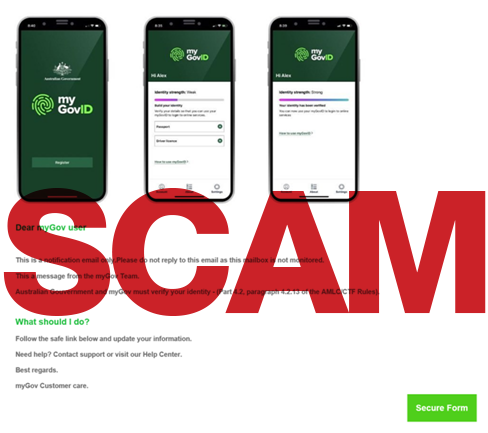
Tax time is almost upon us and with that comes the annual influx of scams trying to trick Aussies out of their money at a time when many are shuffling finances and setting things in order for the end of the financial year.
On Friday, the Australian Taxation Office (ATO) and Services Australia issued a joint statement warning Aussies about a new MyGov scam doing the rounds, saying the fake email looked convincing to the untrained eye but is clearly a fake if you know what to look for. The email includes screen shots of the myGovID app and asks people to click a link to verify their identity using a “secure form” which takes them to a fake myGov page requesting personal identifying information and banking details.
ATO Assistant Commissioner Ben Foster said the new phishing scam contains classic warning signs that it’s not legitimate, for example, asking people to click a link to confirm their details and spelling errors.
“The ATO and myGov does send emails and SMS messages, however will never send you an email or SMS with a hyperlink directing you to a login page for our online services,” Foster said.
“In the lead up to tax time, we expect to see more of these malicious attempts to harvest identity details. So we encourage everyone to be on alert and take the time to remind family and friends to be on the lookout and stay safe online.”

He added that the aim of the scam is to collect personal information from victims rather than gain access to live information via myGov or myGovID.
Services Australia General Manager Hank Jongen said scams were becoming more sophisticated, and people should be wary of emails asking for identity documents or personal identifying information.
“If you’ve opened an email that looks suspicious, don’t click any links, open any attachments or reply to it,” Jongen said.
“If you‘ve received the suspicious email and provided your myGov sign in information you should take immediate action.
“Change your myGov password and if you’ve provided your banking details, contact your bank.
MyGov scams are also being sent through via text message, and similar to the email scams, authorities say you should never click a text message link claiming to be from a government agency as they simply don’t send them.
The best way to protect yourself from scammers is to follow the simple tips below:
Anyone who’s concerned their private information may have been compromised, or those looking for future advice should call Services Australia’s Scams and Identity Theft Helpdesk on 1800 941 126. If you think you’ve been scammed, you can report it to ScamWatch.